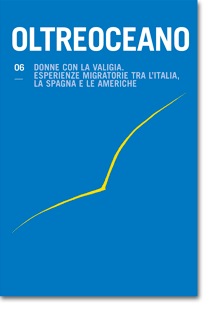Residencia y errancia: perfiles de la emigración en La viajera de Karla Suárez
Keywords:
emigración, Karla Suárez, nostalgia, identidad, espacio domésticoAbstract
Tema recurrente entre las narradoras cubanas de hoy, la emigración encuentra en esta novela una osada forma de contraponer al convencional espacio doméstico y a la nostalgia del origen, la legitimidad de nuevas identidades genéricas y post-nacionales. La viajera, construida a la manera de cajas chinas, relata desde la perspectiva más reciente del a protagonista desdoblada entre prólogo y epílogo, la convivencia de ambas y sus disímiles familias en Roma, e introduce mediante la inserción del diario de Circe, su largo itinerario, desde la salida de La Habana hasta su arribo a Roma, de donde parte a Naxos.
Residency and Errancy: Migration Profiles in Karla Suárez’s La viajera
This novel represents emigration, a recurrent theme among contemporary Cuban women writers, in a way that juxtaposes conventional domesticity and nostalgia for the origins, as well as the legitimacy of general and postnational identities. Structured in Chinese boxes, the viajera narrates the cohabitation of dissimilar families in Rome and, by introducing Circe’s diary, it describes the itinerary, from Havana to Rome, from where she travels to Naxos.
Residenza e peregrinazione: profili di emigrazione in La viajera di Karla Suárez
Tema ricorrente tra le narratrici cubane di oggi, l’emigrazione trova in questo romanzo un modo ardito di contrapporre lo spazio domestico convenzionale e la nostalgia dell’origine, la legittimità di nuove identità generiche e postnazionali. La viajera, costruita alla maniera delle scatole cinesi, racconta dalla prospettiva più recente della protagonista divisa tra prologo ed epilogo, la convivenza di entrambi e delle loro famiglie dissimili a Roma, e introduce attraverso l’inserimento del diario di Circe, il suo lungo itinerario, dalla partenza dell'Avana fino all’ arrivo a Roma, da dove parte per Naxos.
Downloads
References
Anzaldúa, G. (1987): Borderlands / La frontera. San Francisco: Aunt Lute Books.
Campuzano, L. (2008): Tristes tropicales: exilio y mitos clásicos en poetas cubanas de la diáspora. La Gaceta de Cuba, 6, pp. 27-32.
Castells, M. & Subiráts, M. (2007): Mujeres y hombres, ¿un amor imposible? Madrid: Alianza.
Cuesta, A. E. (2008): Gran novela sobre el exilio. Otro lunes. Recuperado de http://www.otrolunes.com/hemeroteca-ol/numero-04/html/librario/librario-n04-a02-p01-2008.html
Fernández Guerrero, O. (2010): Encuentros y desencuentros entre el feminismo y la maternidad. In G. A. Franco Rubio (Ed.), Debates sobre la maternidad desde una perspectiva histórica (siglos XVI-XX) (pp. 425-438). Barcelona: AEIHM/Icaria.
Fernández Pintado, M. (2003): Otras plegarias atendidas. La Habana: Unión.
Guerra, W. (2006):Todos se van. Barcelona: Bruguera.
Guillén, C. (1998): El sol de los desterrados: literatura y exilio. In C. Guillén, Múltiples moradas. Ensayo de Literatura Comparada (pp. 29-97). Barcelona: Tusquets.
Hall, S. (1987): Minimal Selves. In L.Appignanesi; H. Bhabha & al. (Eds.), Identity: The Real Me. – Post-Modernism and the Question of Identity (pp. 44-46). Londres: ICA Document.
Said, E. (1984, otoño): Reflections on Exile. Granta, 13, pp. 159-172.
Suárez, K. (1999): Silencios. Madrid: Ed. Lengua de Trapo.
Suárez, K. (2005): La viajera. Barcelona: Rocaeditorial.
Perugini, C. (2012): Traigo conmigo todo el mapa de España. Le peregrinazioni di Teresa (León). Oltreoceno, pp. 89-96.
Downloads
Published
How to Cite
Issue
Section
License

This work is licensed under a Creative Commons Attribution-NonCommercial-ShareAlike 4.0 International License.
The authors undertake to comply with the following conditions, which are considered accepted at the time of submission of their contributions.
The sending of a text implies that it is unpublished and not submitted to be published elsewhere.
1. If accepted, the author shall confer on the publisher the right to publish and distribute it both in paper form and in the online electronic edition. The published articles will be downloadable and made available in open access.
2. Provided that it correctly indicates that the first publication took place in the journal Oltreoceano. Rivista sulle migrazioni the author has the right to: a) reproduce the article in separate extracts or collected in a volume; b) publish the article on their personal website or teaching site provided that these sites are of a non-commercial nature; c) deposit the article in online archives of a non-commercial nature, linked to the institution they belong to or as part of projects for the non-commercial dissemination and open access of scientific works.
The use of contributions by third parties, for commercial or otherwise unauthorized purposes, is not allowed. The publisher declines all responsibility for the unauthorized use of the material published in the journal.












